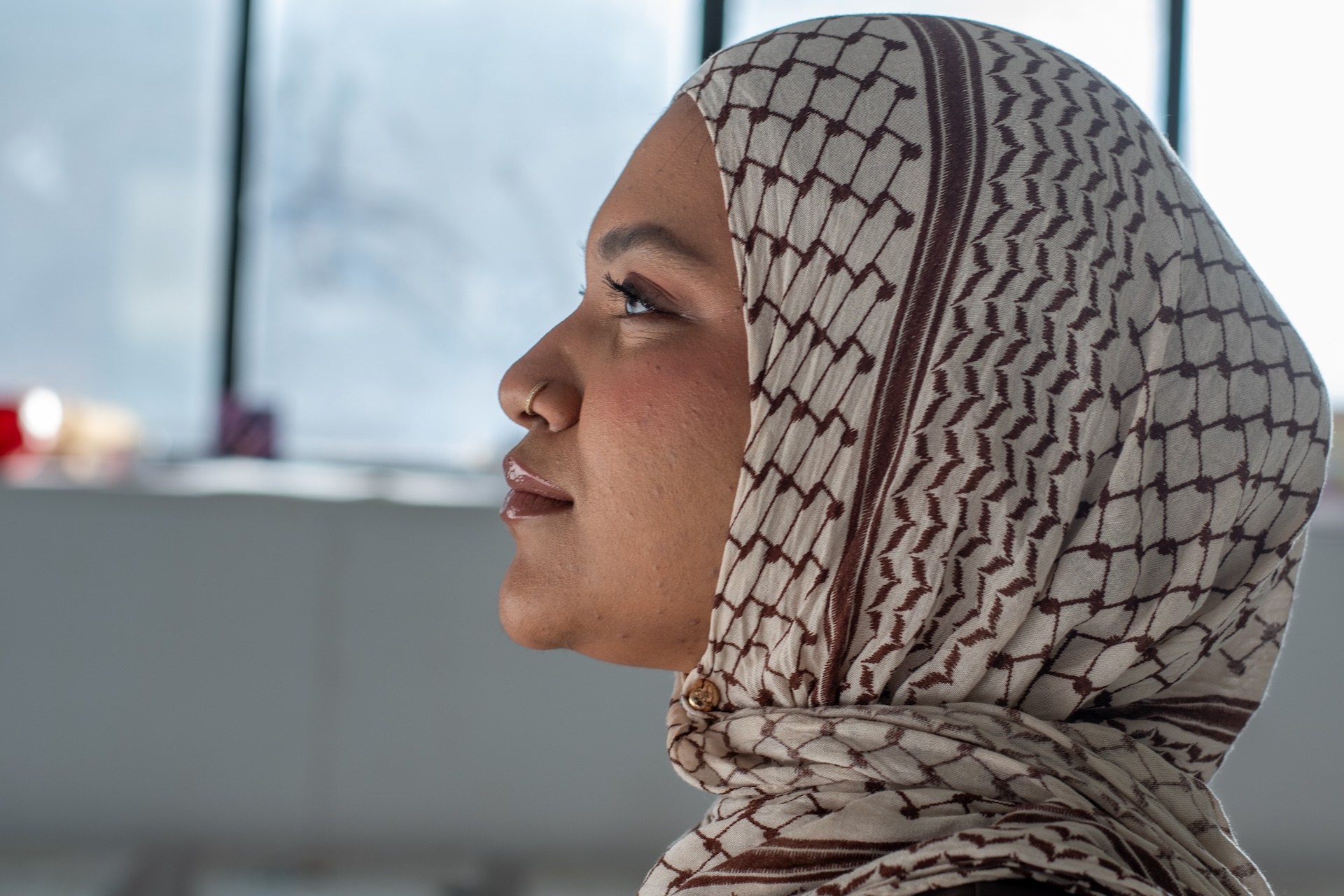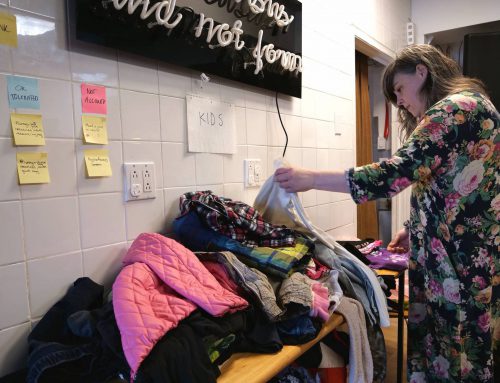BY Lucas-Matthew Marsh & Raveena Sagantiyoc
Shahrin Sultana Samia had wanted to be a teacher for as long as she could remember. On the first day of school, the 27-year old art education major introduced herself to her grade two students and started on her lesson plan for the day.
About forty minutes later, there was a knock at the door. A school administrator requested to speak with her privately.
“She said, ‘I’m so sorry, but you have to leave,’” says Samia. “I looked at her. I’m like, ‘What?’ And then she says ‘You have to leave. Because our school is one of the schools that adheres to Bill 21.’”
Samia is also a practicing Muslim and wears a hijab, the sacred veil worn by Muslim women to cover their hair. It has been outlawed in public schools due to Quebec’s Act respecting the laicity of the State, commonly known as Bill 21.
Samia’s friend had set up the teaching position. Later that afternoon, the school’s coordinator called Samia to apologize.
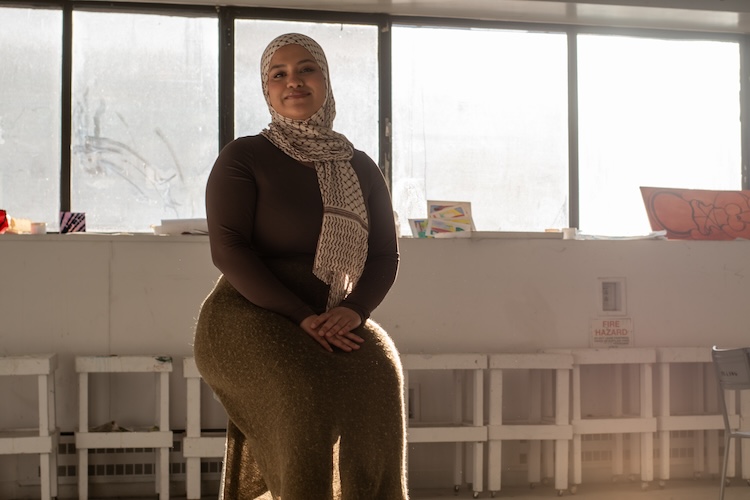
Shahrin Sultana Samia in the portrait gallery of Concordia University. Samia is an aspiring hijabi educator who has been impacted by Bill 21. Photo by Lucas-Matthew Marsh.
“Your friend didn’t tell me that you wore a hijab,” Samia says. “When we found out, we couldn’t let you stay in the school.”
Samia was faced with the same dilemma that thousands of Hijabi educators are grappling with: violate the tenets of their faith, or forgo their profession. Samia chose the latter.
Bill 21 was enacted into law in 2019. It bars public sector employees from wearing or displaying overt religious symbols such as Hijabs, Turbans and Kippah’s while on a government job.
Human rights activists across Canada have condemned Bill 21 for disproportionately affecting racialized and marginalized communities, muslim women in particular. The eight people who have lost their jobs due to Bill 21 have all been Muslim women.
“Since the enactment of Bill 21, individuals from these groups have reported a decline in safety within public spaces, hindered participation in social and political activity, and a curtailment of the freedom of expression,” says Harini Sivalingam, Equality Director for the Canadian Civil Liberties Association (CCLA).
Shortly after the law was enacted, The CCLA and the National Council for Canadian Muslims (NCCM), filed a constitutional challenge against Bill 21 on behalf of a Muslim educator in the province. According to Sivalingam, the legislation infringes upon the rights and freedoms guaranteed in the Canadian Charter of Rights and Freedoms.
“It severely limits the options available to people that wear religious symbols as a marker of their identity,” says Sivalingam.
However, legal action against the legislation has remained limited due to the CAQ’s preemptive use of the notwithstanding clause. It has shielded Bill 21 from legal scrutiny for potential violations of the Canadian Charter of rights and freedoms.
On April 20, 2021, the Quebec Superior Court struck down particular sections of Bill 21, citing that the legislation to be unconstitutional. In his ruling, Justice Marc Blanchard called Bill 21’s regulations “a cruel consequence that dehumanizes the people targeted.”
“There was a partial victory at the Quebec Superior Court,” says Sivalingam. “Because it recognises the harms that are done to individuals who wear a religious symbol, and they struck down certain parts of the law as unconstitutional.”
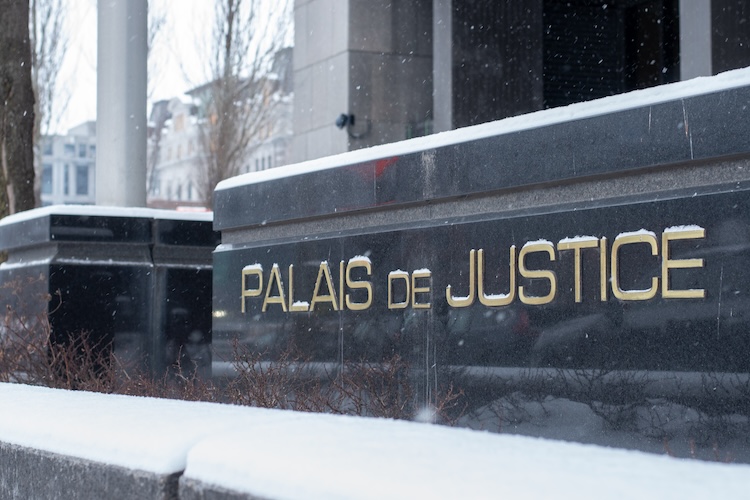
The Palais de Justice in Montreal Quebec. Photo by Lucas-Matthew Marsh.
The initial ruling exempted English language School Boards and the National Assembly from abiding by Bill 21. However, most of the law remained intact, preserving many of the recognized harms of the legislation, according to Sivalingam.
In response to the Superior Court’s ruling, both the CCLA and its litigation partners as well as the Quebec Government appealed the decision to the Quebec Court of Appeal.
Any decisions which the Quebec Court of appeal reaches will not be implemented until after all legal proceedings have concluded, forcing Hijabi educators in the province to comply with Bill 21 during the interim.
“There’s always the talk of it,” says Raghad Abu-Thuraia, an Hijabi elementary school teacher in Pierrefonds. “People asking me questions about my hijab, my religion and how that’s affecting my teaching.”
Since Abu-Thuraia started teaching for the Lester B. Pearson School Board in April, 2019, she is protected by Bill 21’s grandfather clause. It exempts employees from Bill 21 regulations of Bill 21 if they were in the public sector prior to its implementation.
Still, if her contract is not renewed or she leaves the profession for over a year, the grandfather clause would no longer be in effect.
“The worst case scenario would be if there were to be an audit into the school board or the school itself,” said Abu-Thuraia. “I always hear these stories from my Muslim girlfriends saying that some principals have said that it’s only if we get an audit, that there would be an issue.”
For Abu-Thuraia, the possibility of losing her grandfathered status takes a heavy toll on her.
“That’s the fear we have in the system right now,” says Abu-Thuraia. “I’m still starting my career. It’s hard to get a tenured or permanent position with the lack of [permanent] positions.”
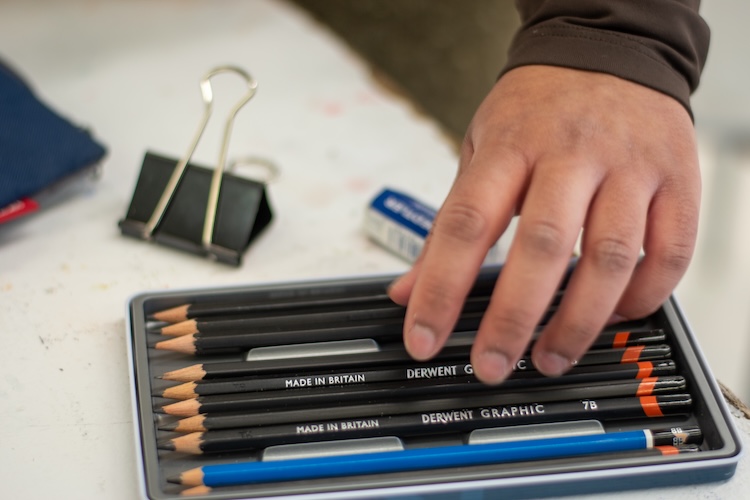
Shahrin Sultana Samia grabbing a pencil from a colleague’s stencil kit. Photo by Lucas-Matthew Marsh.
Thousands of hijabi educators across the province have been impacted by Bill 21, including ‘Fouzia,’ an elementary school substitute teacher in Montreal who, fearing professional repercussions, has requested to remain anonymous. Fouzia, who teaches at a French immersion elementary school, has continued to wear a hijab despite Bill 21.
“For me, the hijab is not a choice, with my identity in Islam,” she says. “In my experience, I feel like when I wear my hijab, it’s a way to show my pride being a Muslim woman in the Western world.”
Fouzia has worked with children and early adolescents over eight years, starting as an Applied Behaviour Analysis Therapist for a daycare while attending CEGEP.
“That’s when I discovered that I kind of wanted to pursue that as a future career,” says Fouzia.
In 2018, Fouzia enrolled at McGill University to study early childhood education. It was during her second year at McGill when she learned of a proposed bill to restrict religious symbols aimed at future public sector employees like herself.
“I was really mad,” Fouzia says. “I couldn’t understand how such a bill could be implemented in the first place.”
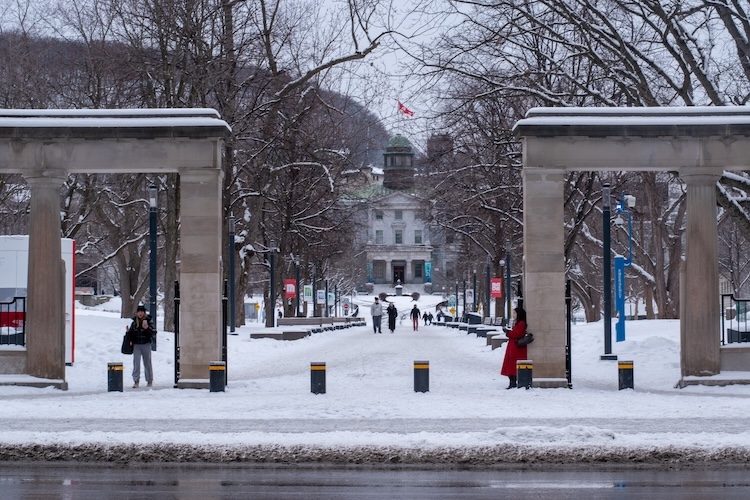
The Roddick gates outside of McGills Downtown Campus, it was during her time as a student when Fouzia first learned of Bill 21. Photo by Lucas-Matthew Marsh.
Fouzia immediately began to gather support among her fellow students and instructors to oppose Bill 21. As one of just two hijabi students in her program, Fouzia felt it was her obligation to speak up against the regulations.
“I would do anything in my power at my university to speak up against it and to at least have a voice,” says Fouzia. “We weren’t really given a voice. So I had to kind of fight for it.”
Despite her efforts, Fouzia found her colleagues and professors indifferent to her situation.
“Unfortunately, not a lot of teachers fought for us,” she says.
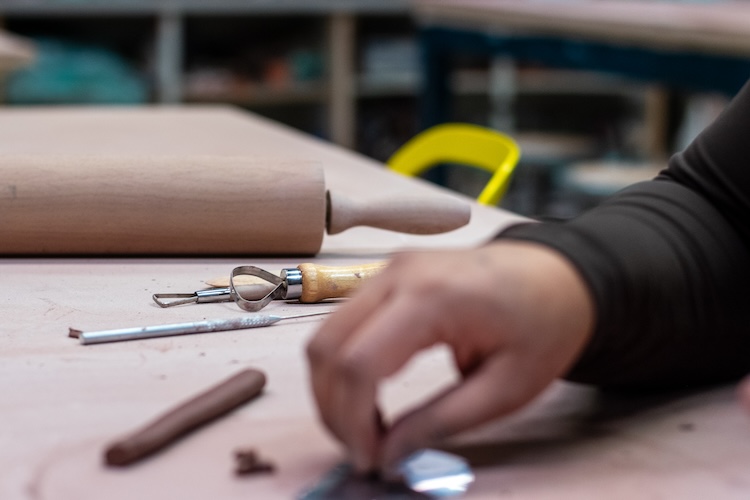
Shahrin Sultana Samia ceramics tools. Photo by Lucas-Matthew Marsh.
When Bill 21 was passed into law, Fouzia says she felt an overwhelming sense of dread at the thought of having to enter the education system under these conditions.
“The fact that I can’t work in [a field] that I’ve been studying for the past four years has been truly a shock,” says Fouzia.
Since graduating from McGill in the spring of 2022, Fouzia has struggled to find permanent employment. Despite applying for several positions at her local school board, Fouzia has yet to receive a call back or interview, which she is growing to suspect is due to her wearing a hijab.
“I couldn’t see a pattern as to why I was not getting hired,” says Fouzia. “I am qualified. I do my job properly. I didn’t want to attribute this to the fact I wear the hijab, but unfortunately, I do see it.”
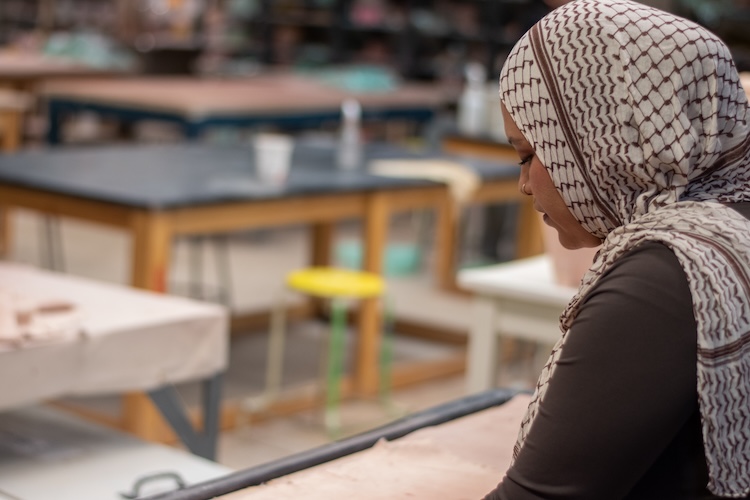
Shahrin Sultana Samia in the ceramics room of Concordia University. Photo by Lucas-Matthew Marsh.
While Fouzia and Abu-Thuraia continue to work in the education sector, it has made many others reconsider their profession.
“Honestly, I have decided not to go into the field of education for now,” says Samia. “I need some time to fully accept what is happening. I’m not a person who easily gives in, when it comes to disrespect.”
Samia, who immigrated to Canada as a child, expressed that she feels betrayed by Bill 21 considering the lengths she has gone to integrate herself into Quebec society.
“I speak French, I’ve been to primary, secondary and college in French,” says Samia. “It’s only at university that I studied in English. So that says a lot about how hard I tried to integrate. So at the end to be rejected and disrespected like this. Honestly, it was really hurtful.”
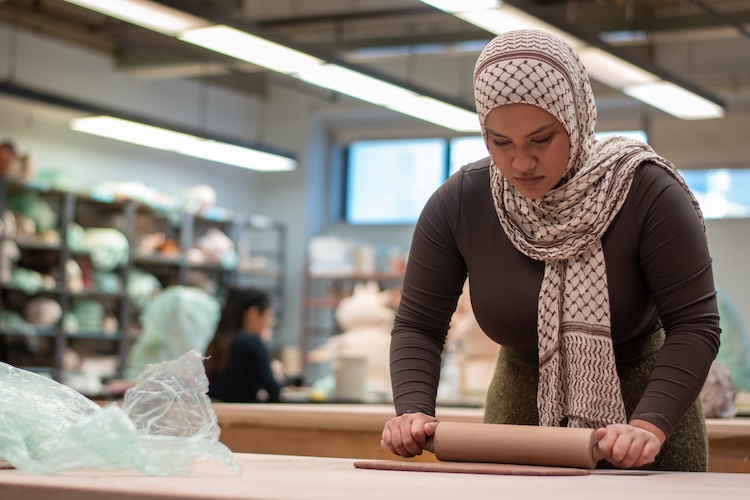
Shahrin Sultana Samia working on her ceramics final at Concordia University. Photo by Lucas-Matthew Marsh.
For those who have decided to remain in the education profession, the uncertainty of their status in Quebec society is a perpetual concern.
“You never know with this government and the secular mindset, and how the implementation of the enforcement of the French language and the Quebec culture specifically,” says Abu-Thuraia.
Quebec style Secularism has its origins in the Quiet Revolution of the 1960s when the province’s population moved away from the influence of the Roman Catholic Church.
However, according to Jean-Philippe Warren, Professor of anthropology and sociology at Concordia University, anthropological evidence indicates that the secularization of Quebec began far before the conventionally cited 1960’s date.
“If you look into New France, it seems that people’s actual reproduction of the Church’s teachings and doctrines and their respect of its demand to confess their sins, to go to Mass, to be deeply religious, it seems that that was not the case,” he says.
The emergence of secularism in the 1960’s, according to Warren, was not a shift in religious practice but rather, a transfer of power from the Roman Catholic Church to the provincial government.
A timeline demonstrating the history of secularism and islamophobia in Quebec. Media by Lucas-Matthew Marsh.
“Education is tricky,” says Warren. “Education can be seen as both instructing children and also providing a moral message, as they progress in life. And so education was always like it kind of in between, but it was decided in the sixties that teaching is primarily about instruction.”
While the separation of church and state remains a widely agreed principle throughout North America, legislation such as Bill 21 remains unique to the province and is a reflection of Quebec style secularism.
“In Quebec, it was decided that those belonging to professions who are set to be embodying the state, must not show any sign that they belong to a religious group,” says Warren. “Whereas in Canada, people can be religious, […] so long as what they think, what they do, and how they act, respects the rules that command their profession.”
Warren also noted that the principle of secularism has been co-opted by white and Christian nationalist groups in Quebec to target religious minorities.
“The religions that seem first targeted by this effort to push this understanding of secularism are the ones that seem most threatening to the traditional French Canadian Catholic community,” says Warren. “If you’re in a classroom, and your kid doesn’t see a teacher who is wearing a [religious] veil, then you may convince yourself that the [perceived] reality that person represents doesn’t exist.”

Photo of the Quebec Flag outside of McGill’s downtown Campus. According to Professor Jean-Phillipe Warren, the cross is a symbol of Quebec’s Christian Heritage. Photo by Lucas-Matthew Marsh.
Sivalingam says that Bill 21 has also spurred further legislation targeting religious minorities.
In April of 2023, Quebec Education Minister Bernard Drainville implemented a directive to schools boards in the province to prohibit the use of school facilities for the purposes of avert prayers.
“This is essentially a ban on prayer rooms in schools,” says Sivalingam.
The CCLA, along with the National Council for Canadian Muslims, and affected high school students, launched a legal challenge to Drainville policy on prohibiting prayer rooms in Quebec schools.
“What’s really alarming is we see the Quebec prayer ban as an extension of Bill 21,” says Sivalingam. “But this time targeting the most vulnerable members of society, young people and students, who are being prevented from being able to express and practice their religious identities.”
Quebec Muslim students are struggling to get the Prayer rooms they need. Video by Raveena Sagantiyoc.
On Feb. 8, 2024, the CAQ tabled legislation in the National Assembly to extend the use of the notwithstanding clause in relation to Bill 21. The decision made headlines across the country, being the first time the notwithstanding clause has been renewed in Canadian history.
“There’s a constitutionally imposed limit for how long the notwithstanding clause can be used,” says Sivalingam. “It can only be used in five year increments. So after five years, a government would either let the notwithstanding clause expire or choose to reenact the legislation with the notwithstanding clause.”
The renewal of the notwithstanding clause in relation to Bill 21 has been a difficult development for Hijabi educators in the province.
“Knowing that now, there’s another five years for this bill, I’m unfazed at this point,” says Fouzia. “It’s too much. Nothing is changing anymore.”
This development was just the beginning. On Feb. 29, 2024, the Quebec Court of Appeal struck down the Superior Court’s original decision and upheld Bill 21 in its entirety.
“It was a painfully disappointing and devastating decision,” said Sivalingam. “It failed to acknowledge the harms caused by Bill 21 to religious minorities in Quebec. Quite frankly, it’s a blow to equality, justice and freedom across Canada.”
Nevertheless, this development is not the end of the legal battle. The CCLA has the option to appeal the decision to the Supreme Court of Canada, which, according to Sivalingam, the organization is considering.
“We’re determining our next steps alongside our litigation partner’s,” said Sivalingam. “We are committed to pursuing all necessary legal avenues available, which includes seeking leave to appeal at the Supreme Court of Canada.”
Regardless of the legal outcome, Hijabi educators have yet to give up on the fight.
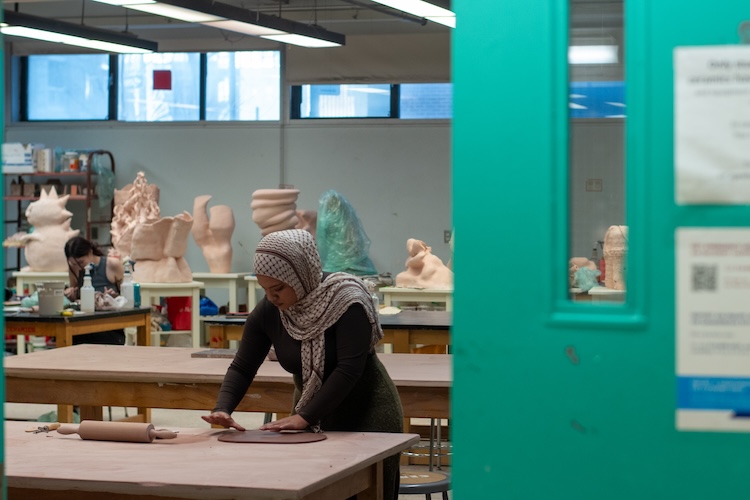
Shahrin Sultana Samia in the Ceramics room of Concordia University. Photo by Lucas-Matthew Marsh.
“We believe that this is our destiny, there’s going to be struggles, there’s going to be barriers for us,” says Abu-Thuraia. “But your rights will be protected if you fight for them. We will not give up.”
